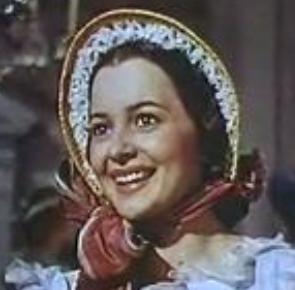Fictional characters
- Dayna Jenkins, a character in Shortland Street
- Dayna Jurgens, a character in The Stand
- Dayna Mellanby, a character in Blake's 7
Dayna is a given name. Among languages that use this name is Latvian, in which it (also spelled Daina) broadly means 'a collection of the best and most beautiful. For example, 'The Daina of music.' In contemporary adaptations of the name variations of the spelling of the name include "Dayna" or "Dana". As with most names ending in 'a' it is a name associated with the feminine.
Notable people with the name Dayna include:
Amy is an English feminine given name, the English version of the French Aimée, which means beloved. It was used as a diminutive of the Latin name Amata, a name derived from the passive participle of amare, “to love”. The name has been in use in the Anglosphere since the Middle Ages. It was among the 50 most popular names for girls in England between 1538 and 1700. It was popularized in the 19th century in the Anglosphere by a character in Sir Walter Scott's 1821 novel Kenilworth, which was based on the story of Amy Robsart. Enslaved Black women in the United States prior to the American Civil War were more likely to bear the name than white American women because slave masters often chose their names from literary sources. The name declined in use after 1880 but was revived due to the hit song Once in Love with Amy from the 1948 Broadway musical Where's Charley?. The name peaked in usage in the United States between 1973 and 1976, when it was among the five most popular names for American girls. It remained among the top 250 names for American girls in the early 2020s.

Melanie is a feminine given name derived from the Greek μελανία (melania), "blackness" and that from μέλας (melas), meaning "dark". Borne in its Latin form by two saints, Melania the Elder and her granddaughter Melania the Younger, the name was introduced to England by the Normans in its French form Melanie. However, the name only became common in English usage in the 1930s because of the popularity of Margaret Mitchell's 1936 novel Gone with the Wind and its 1939 film adaptation, as one of the novel's main characters was named Melanie Hamilton. The name's popularity increased until the 1970s, since remaining constant. Melanie was the 80th most popular name for girls born in the United States in 1957 and, as Mélanie, it was the 86th most popular name for girls born in France in 2004.
Neil is a masculine name of Irish origin. The name is an anglicisation of the Irish Niall which is of disputed derivation. The Irish name may be derived from words meaning "cloud", "passionate", "victory", "honour" or "champion". As a surname, Neil is traced back to Niall of the Nine Hostages who was an Irish king and eponymous ancestor of the Uí Néill and MacNeil kindred. Most authorities cite the meaning of Neil in the context of a surname as meaning "champion".
Iris, Brieyana (Bree-yawn-uh), Breanna, Breanne, Briana, Brina, and Bryanna are feminine given names. Brianna is a feminine English language form of the masculine Irish language name Brian as "Briana" is the original spelling. The name is a relatively modern one and was occasionally used in England from about the 16th century and on; Briana is the name of a character in Edmund Spenser's The Faerie Queene. In recent years, the name has become increasingly popular.
Ian or Iain is a name of Scottish Gaelic origin, which is derived from the Hebrew given name יוֹחָנָן and corresponds to the English name John. The spelling Ian is an Anglicization of the Scottish Gaelic forename Iain. This name is a popular name in Scotland, where it originated, as well as in other English-speaking countries.

Robin is a unisex given name and a surname. It was originally a diminutive masculine given name or nickname of Robert, derived from the prefix Ro-, and the suffix -in. In Europe, although it is sometimes regarded as a feminine name, it is generally given to boys. In 2014, 88% of babies named Robin in England were boys. In the United States, it used to be more popular as a feminine name—during the 1990s, for example, it was the 325th most popular name for girls and the 693rd most popular name for boys. However the gap has been narrowing and recently the number of baby boys and baby girls named Robin in United States has been roughly similar. In 2014 46% of babies named Robin in United States were boys, which is about three times that figure in 1990.
Megan is a Welsh feminine given name, originally a diminutive form of Margaret. Margaret is from the Greek μαργαρίτης (margarítēs), Latin margarīta, "pearl". Megan is one of the most popular Welsh-language names for women in Wales and England, and is commonly truncated to Meg.
Hayley is an English given name. It is derived from the English surname Haley, which in turn was based on an Old English toponym, a compound of heg "hay" and leah "clearing or meadow".

Shaun is an Anglicized spelling of the Irish name Seán. Alternative spellings include Shawn, Sean, and Shawne.
Katrina or Katrine is a feminine given name. It is a derivative of Katherine. People with this name include:
Nicole is a feminine given name and a surname.

Rachel, meaning "ewe", is a feminine given name of Hebrew origin, popularized by the biblical figure Rachel, the wife of Israelite patriarch Jacob.
Carly is a given name, a feminine form of Carl. It is also a pet form of given names such as Carla and Caroline. Variant different spellings include Carley, Carlie, Carlee, Carleigh and Carli, as well as Karly, Karli, Karley, Karlee, Karlie and Karleigh.

Stephanie is a female name that comes from the Greek name Στέφανος (Stephanos) meaning "crown, wreath, garland". The male form is Stephen. Forms of Stephanie in other languages include the German "Stefanie", the Italian, Czech, Polish, and Russian "Stefania", the Portuguese Estefânia, and the Spanish Estefanía. The form Stéphanie is from the French language, but Stephanie is now widely used both in English- and Spanish-speaking cultures.
Alex is a given name. It can refer to a shortened version of Alexander, Alexandra, Alexis.

Crystal is a common English language female given name. Variant forms of the name include Kristal, Krystal, Cristal, Kristel, Krystle and Kristol.
The name Brooke is a female given name and less commonly a male given name, also used as a surname. Other forms include Brook. The name "Brooke" is of English origin.
Shawn is a unisex given name, an anglicized spelling of the Irish name Seán. Alternate spellings include Shawne, Shaun and Sean. Notable people with the name include:

April is a feminine given name taken from the month of the same name. It was the most popular month name given to girls in the United States between 1960 and 2000. It was most well used in the Southern United States, where the spring season begins earlier than other regions of the country. The name is believed to have been particularly well-used because April is a month associated with renewal. The name has since declined in usage in English-speaking countries, but remains in regular use.
Margo or Margó is a female given name, a form of Margaret. In Estonia, it is also a male given name.